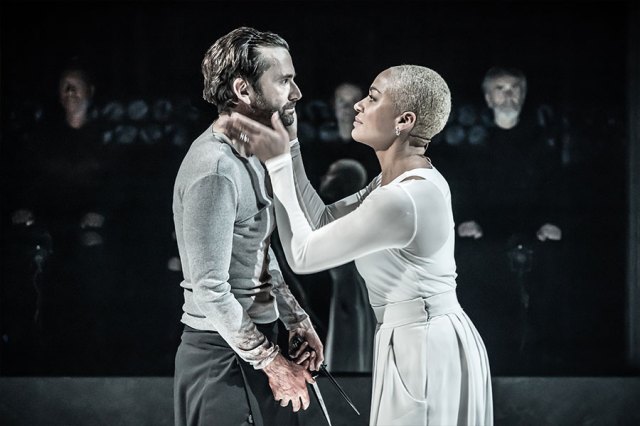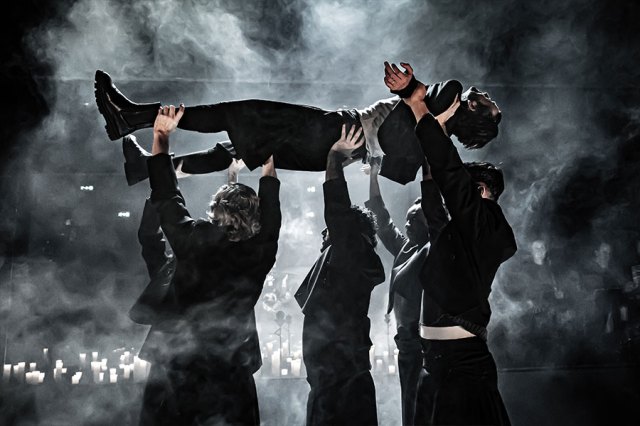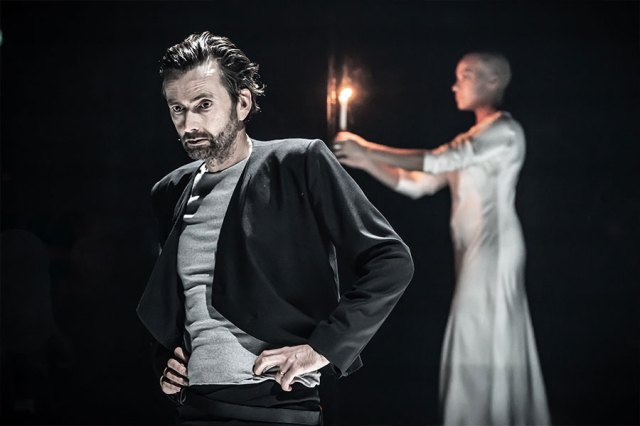Macbeth review – David Tennant and Cush Jumbo in a Scottish play for the digital age
The Donmar Warehouse production runs until 10 February 2024

This feels like a Macbeth for the digital age, one perfectly tailored for fans of its star David Tennant. It’s stylish, evocative – and slightly distancing. But never for a moment can you tear your attention away.
Its main feature is to make you listen to Shakespeare through binaural headphones, rendering both the actor’s voices and Gareth Fry’s astonishing soundscape in sharp 3D. To begin with, this yields richly imaginative dividends. In pitch darkness, the murmuring voices of the witches emerge against a background of bird screeches and cries. The sense of mystery and of evil is all-encompassing.
When Tennant’s Macbeth appears on Rosanna Vize’s raised white stage, he is washing the blood of battle away. Behind him, like ghosts, the rest of the cast and three musicians line up behind a glass screen, talking quietly. The headphones let us into secrets. Macbeth has only to whisper his darkest thoughts and we are there, with his vaulting ambition, inside his head. As he talks quietly to Banquo, he is surprisingly sinister.
Cush Jumbo’s Lady Macbeth arrives full of sadness, accompanied by a soundtrack of children laughing – the only English woman in a Scottish court, dressed in white rather than the grey tops and black kilts of the others. This is someone who is clearly already almost unhinged by grief, haunted by a child who has died and Jumbo makes her a remarkable combination of steel and softness.
Meeting Tennant’s conversational Macbeth, she provides the driving force towards murder, fierce to his weakness. Yet as they do their bloody deed, she is struggling to convince herself that “the sleeping and the dead are but as pictures”, while Tennant’s Macbeth has already donned the mask of nihilism that propels him deeper and deeper into blood.
Both performances are wonderfully observed, Jumbo finding nuanced depths that are only hinted at, holding the hand of her lost child in the sleepwalking scene for example. Tennant discovers new meanings in familiar lines, playing on a sardonic sense of weariness as Macbeth hurtles towards his doom.

Director Max Webster stages the whole thing with great flair and makes many intriguing interventions. It is clever, for example, to make the boy who plays Fleance (a serious faced Casper Knopf) also play Macduff’s son and Young Siward; in the second two instances, Macbeth slays him, wrapping him in his arms in a distorted fatherly love, literally killing his hopes. The banquet scene benefits hugely from the fact that Tennant is centre stage throughout; we only hear a suggestion of Banquo.
Other interpolations are odder. A porter’s scene, played by Jatinder Singh Randhawa as pure stand-up, with an audience response on some knock knock jokes, breaks the mood so entirely that it is hard for the sense of darkness so beautifully conjured up to that point to reassert itself. The headphones too start to pay diminishing returns. The quiet asides seem to dry up, the music is over-insistent, and it is annoying rather than mysterious to hear Jumbo’s lines echoed in your ears when the clarity of her original delivery is so forceful.

The staging becomes more conventional too, ending with a battle with flashing lights, loud explosions and lots of smoke. The sound world created, and the performances offered feel as if they deserve something more. But there’s no doubting the all round strength of the production, with Rona Morison and Noof Ousellam bringing heft to the Macduffs and Cal Macaninch offering an intelligently wary Banquo.
The final image of the dead butcher lying in a pool of his own blood as the world around him suddenly becomes full of colour and life is another example of the production’s technical inventiveness. This is a cool, studied Macbeth, with a clear view of where it’s headed. It didn’t move me, but in its own chilly way, it strikes deep chords.

















